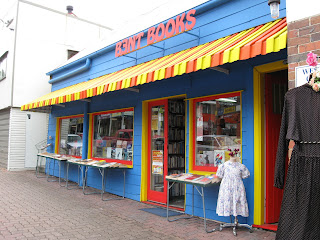A young Shepard is sent on a journey for his Personal Legend by a gypsy when he visits a town on his usual route through his lands. So, he takes a chance, sells his sheep and begins his journey that takes him away from the comforts of his homelands and across the Great Desert. The young man learns many things from many people he meets during this journey; from a king to a man who owns a crystal shop to an Englishman who owns many books who is searching for the alchemist. While the young man takes his journey, he finds his Personal Legend takes him in many different directions, but it never changes. And he's taught one main lesson: never to ignore his Personal Legend, or to stop listening to it, or it will stop leading him in his life.
At first, I found this book hard to get into, but then, it became something I couldn't put down. It doesn't have any chapter headings, so you can easily keep reading and reading and lose track of time; which made it easy for me to read up to 50 pages in one sitting. So, I read this book in about four long sittings; and found it was brilliantly written and didn't bog me down with too much detail, pulling me along, letting me colour in the background with my own brush.
Paulo Coelho, born in Rio de Janeiro, Brazil, in August 1947. He was the son of Pedro Queima Coehlo de Souza, an engineer and his wife, Lygia, a homemaker.
Early on, Paulo dreamed of an artistic career, which was frowned upon in his middle-class household. In the austere surroundings of a strict Jesuit school, Paulo discovered his true vocation: to be a writer. Paulo's parents had different plans for him, however. When their attempts to suppress his devotion to literature failed they took it as a sign of mental illness; and at seventeen, his father had him committed to a mental institution, twice, where he entured session of electroconvulsive "therapy". His parents brought his back there once more after be became more involved with a theatre group and began to work as a journalist.
Paulo was always a nonconformist and a seeker of the new. In 1968, in the excitement of the guerrilla and hippie movement too hold in Brazil, Paulo embraced progressive politics and joined the peace-and-love generation. He sought spiritual experience, traveling all over Latin America in the footsteps of Carlos Cataneda. He worked in theatre and dabbled in journalism, launching an alternative magazine called 2001. He began to collaborate with music producer Raul Seixas as lyricist, transforming the Brazilian rock scene. In 1973, Paulo and Raul joined the Alternative Society, an organisation that defended the individual's right to free expression, and began publishing a series of comic strips calling for more freedom. Members of the organisation were detained and imprisoned. Two days later, Paulo was kidnapped and tortured by a group of paramilitaries.
Due to this profound experience, he decided that at the age of twenty-six, he had had enough of living life on the edge and wanted to be "normal". He worked as an executive in the music industry then tried his hand at writing; but didn't get into it seriously until after had an encounter with a stranger. First, saw the man in a vision, then met him in a cafe in Amsterdam. The stranger suggested that Paulo should return to Catholicsm and study the benign side of magic. He also encouraged Paulo to walk the Road of Santiago de Compostela, the medieval pilgrim's route.
In 1987, a year after completing that pilgrimage, Paulo wrote The Pilgrimage: Diary of Magus. The book describes his experiences and his discovery that the extraordinary occurs in the lives of ordinary people. A year later, Paulo wrote a very different book, The Alchemist. The first edition sold only nine hundred copies and publishing house decided not to reprint. Paulo would not surrender his dream; and found another - bigger - publishing house.
He wrote Brida (a work still unpublished in English) that received a lot of attention in the press and both The Alchemist and The Pilgrimage appear on the best seller lists. The Alchemist went on to sell more copies than any other book in Brazilian literary history.
I'm currently looking for an official website for Paulo Coelho; however it only comes up with a Wiki page; something I'm not happy with. So, I'll keep on searching for you all.





